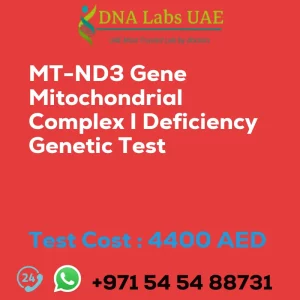PET100 Gene Mitochondrial Complex IV Deficiency Genetic Test
Cost: AED 4400.0
Symptoms, Diagnosis, and Test Details
PET100 gene mitochondrial complex IV deficiency is a rare genetic disorder that affects the function of complex IV, also known as cytochrome c oxidase, in the mitochondria. Complex IV is responsible for the final step in the electron transport chain, which is essential for generating energy in the form of ATP.
NGS (Next-Generation Sequencing) genetic testing is a method used to analyze a person’s DNA to identify genetic variations or mutations that may be responsible for a particular disorder or condition. In the case of PET100 gene mitochondrial complex IV deficiency, NGS genetic testing can be used to identify mutations or variations in the PET100 gene that may be causing the disorder.
NGS genetic testing involves sequencing the DNA of an individual and comparing it to a reference genome to identify any differences or mutations. This type of testing can provide valuable information about the specific genetic changes that are responsible for a disorder and can help guide treatment and management strategies.
By identifying the specific genetic mutations in the PET100 gene, NGS genetic testing can help diagnose mitochondrial complex IV deficiency and provide important information about the severity of the condition, the risk of complications, and potential treatment options. It can also help determine if other family members may be at risk of inheriting the disorder.
Test Components and Price
- Components: PET100 Gene Mitochondrial Complex IV deficiency Genetic Test
- Price: AED 4400.0
Sample Condition and Report Delivery
Sample Condition: Blood or Extracted DNA or One drop Blood on FTA Card
Report Delivery: 3 to 4 Weeks
Test Method and Type
Method: NGS Technology
Test Type: Neurological Disorders
Doctor and Test Department
Doctor: Neurologist
Test Department: Genetics
Pre Test Information
Clinical History of Patient who is going for PET100 Gene Mitochondrial Complex IV deficiency NGS Genetic DNA Test
A Genetic Counselling session to draw a pedigree chart of family members affected with PET100 Gene Mitochondrial Complex IV deficiency
Important Considerations
It is important to note that NGS genetic testing may not be available in all healthcare settings and may require a referral to a specialized genetic testing laboratory. Additionally, the interpretation of the test results should be done by a qualified geneticist or genetic counselor to ensure accurate and appropriate diagnosis and management of the condition.
| Test Name | PET100 Gene Mitochondrial complex IV deficiency Genetic Test |
|---|---|
| Components | |
| Price | 4400.0 AED |
| Sample Condition | Blood or Extracted DNA or One drop Blood on FTA Card o |
| Report Delivery | 3 to 4 Weeks |
| Method | NGS Technology |
| Test type | Neurological Disorders |
| Doctor | Neurologist |
| Test Department: | Genetics |
| Pre Test Information | Clinical History of Patient who is going for PET100 Gene Mitochondrial complex IV deficiency NGS Genetic DNA Test A Genetic Counselling session to draw a pedigree chart of family members affected with PET100 Gene Mitochondrial complex IV deficiency |
| Test Details |
PET100 gene mitochondrial complex IV deficiency is a rare genetic disorder that affects the function of complex IV, also known as cytochrome c oxidase, in the mitochondria. Complex IV is responsible for the final step in the electron transport chain, which is essential for generating energy in the form of ATP. NGS (Next-Generation Sequencing) genetic testing is a method used to analyze a person’s DNA to identify genetic variations or mutations that may be responsible for a particular disorder or condition. In the case of PET100 gene mitochondrial complex IV deficiency, NGS genetic testing can be used to identify mutations or variations in the PET100 gene that may be causing the disorder. NGS genetic testing involves sequencing the DNA of an individual and comparing it to a reference genome to identify any differences or mutations. This type of testing can provide valuable information about the specific genetic changes that are responsible for a disorder and can help guide treatment and management strategies. By identifying the specific genetic mutations in the PET100 gene, NGS genetic testing can help diagnose mitochondrial complex IV deficiency and provide important information about the severity of the condition, the risk of complications, and potential treatment options. It can also help determine if other family members may be at risk of inheriting the disorder. It is important to note that NGS genetic testing may not be available in all healthcare settings and may require a referral to a specialized genetic testing laboratory. Additionally, the interpretation of the test results should be done by a qualified geneticist or genetic counselor to ensure accurate and appropriate diagnosis and management of the condition. |








